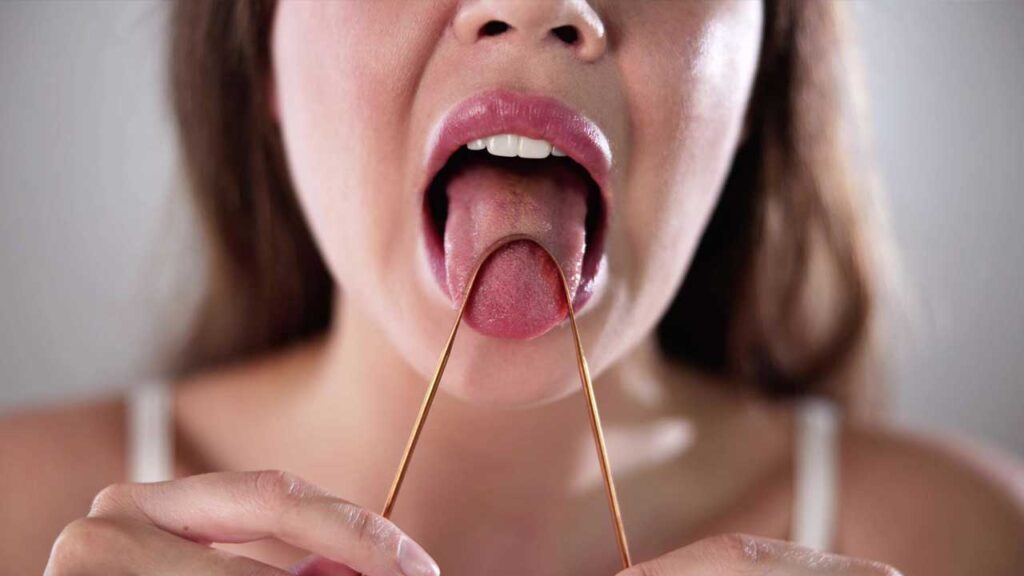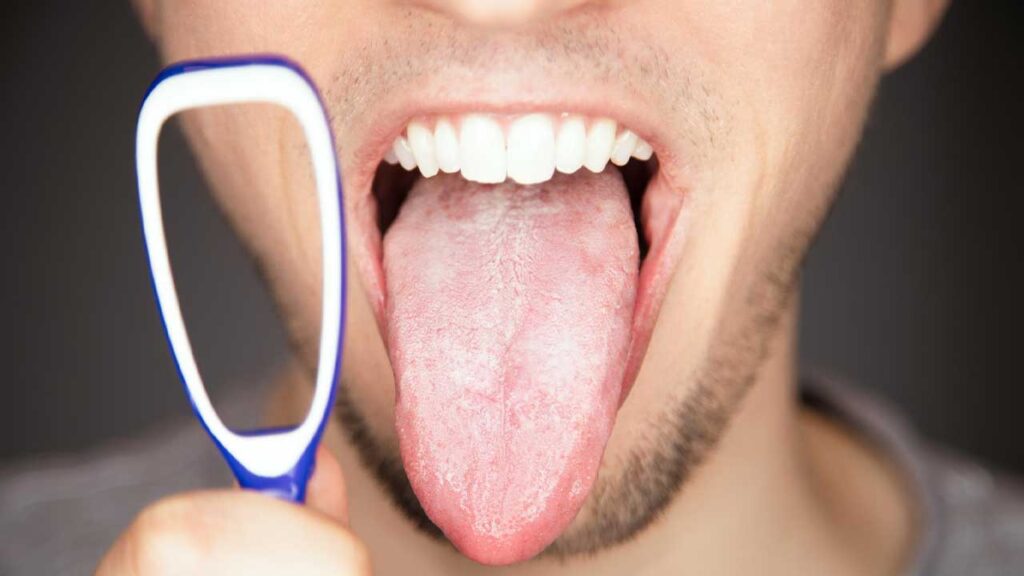You may have heard of tongue scraping, a practice that involves using a tool to remove bacteria, debris, and dead cells from the surface of your tongue. But do you know why tongue scraping should be part of your daily routine?
Tongue scraping is not just a fad or a trend, but a proven way to improve your oral health and overall well-being. In this article, we will explain the benefits of tongue scraping, how to do it properly, and how to choose the best tool for your needs.

The Benefits of Tongue Scraping
Tongue scraping has been around for thousands of years, as part of the ancient Ayurvedic tradition of India. According to Ayurveda, tongue scraping helps remove toxins from the body, improve digestion, and activate vital organs. Modern research also supports the benefits of tongue scraping for oral health and beyond. Here are some of the reasons why you should scrape your tongue every day:
It prevents bad breath.
One of the main causes of bad breath is the accumulation of bacteria on the tongue, especially at the back where the toothbrush cannot reach. These bacteria produce foul-smelling gases that can make your breath unpleasant. Tongue scraping can effectively remove these bacteria and reduce bad breath. In fact, studies have shown that tongue scraping is more effective than brushing at removing odor-causing bacteria.
It improves your sense of taste.
Your tongue is covered with tiny bumps called papillae, which contain taste buds that allow you to perceive different flavors. However, when your tongue is coated with a layer of bacteria, debris, and dead cells, your taste buds can become blocked and dull. Tongue scraping can help clear this layer and expose your taste buds, enhancing your sense of taste. This can also help you enjoy your food more and prevent overeating or cravings for unhealthy foods.
It prevents cavities and gum disease.
The bacteria that cause bad breath can also cause tooth decay and gum disease by producing acids that erode your enamel and inflame your gums. Tongue scraping can help prevent these problems by removing plaque and bacteria from your tongue, reducing the amount of acid and inflammation in your mouth. This can also help protect your teeth from sensitivity, discoloration, and loss.
It improves your overall health.
Your oral health is closely linked to your overall health, as the bacteria in your mouth can enter your bloodstream and affect other parts of your body. Poor oral hygiene can increase the risk of various diseases, such as diabetes, heart disease, stroke, respiratory infections, and cancer. Tongue scraping can help improve your overall health by removing harmful bacteria from your mouth, boosting your immune system, and preventing systemic inflammation.
It enhances your appearance and confidence.
Your tongue is an important part of your smile, as it frames and supports your teeth. However, if your tongue is white or discolored due to bacterial buildup, it can affect the contrast and brightness of your smile. Tongue scraping can help improve the appearance of your tongue by removing the coating and restoring its natural pink color. This can also boost your confidence and self-esteem, as you can smile more freely and comfortably.
How to Scrape Your Tongue?
Scraping your tongue is a simple and easy process that takes only a few minutes. However, you should follow some basic steps to scrape your tongue properly and safely. Here are some tips on how to scrape your tongue:
- Choose a tongue scraper that suits your needs and preferences. A tongue scraper is a tool that is specially designed to remove the coating from your tongue. There are different types and shapes of tongue scrapers, such as metal, plastic, or silicone ones, as well as ones that have a curved, flat, or serrated edge. You should choose a tongue scraper that is comfortable, durable, and easy to clean. You can buy a tongue scraper from online stores, pharmacies, or dental clinics. You can also ask your dentist or dental hygienist for their recommendations on what type or brand of tongue scraper to use.
- Clean your tongue scraper before and after each use. You should rinse your tongue scraper with water or alcohol before and after each use to remove any bacteria or residue. You should also store your tongue scraper in a dry and clean place.
- Brush your teeth and floss them before scraping your tongue. This will help remove any plaque or food particles from your teeth and gums that may interfere with the effectiveness of the tongue scraper.
- Rinse your mouth with water or mouthwash to moisten your tongue and prepare it for the scraping.
- Stick out your tongue and hold it with your lips or teeth. This will help you access the entire surface of your tongue and prevent gagging.
- Place the tongue scraper at the back of your tongue and gently pull it forward to the tip of your tongue. You should apply light pressure and move the tongue scraper in one direction only. Do not push too hard or move the tongue scraper back and forth, as this may damage or irritate your tongue.
- Repeat this for each section of your tongue, using a clean part of the tongue scraper each time. You should cover the entire surface of your tongue, including the sides and the center.
- Rinse your mouth with water or mouthwash after scraping your tongue to remove any residue or bacteria.
- Inspect your tongue and repeat the scraping if necessary. You should aim for a pink and smooth tongue without any coating or discoloration.
You should scrape your tongue once or twice a day, preferably in the morning and before going to bed. You should also scrape your tongue after eating or drinking anything that can cause bad breath or affect your taste buds, such as garlic, onion, coffee, or alcohol.
How to Choose a Tongue Scraper?
There are many types and brands of tongue scrapers available on the market, so you may wonder how to choose the best one for you. Here are some factors that you should consider when choosing a tongue scraper:
The material and quality:
The material and quality of the tongue scraper should reflect its durability and performance. You should look for a material that is sturdy, smooth, and easy to clean, such as metal, plastic, or silicone. You should also look for a quality that is high and reliable, such as a reputable brand that offers a warranty or guarantee for its products. You should also compare different prices and reviews online or in stores before making a purchase.
The shape and size:
The shape and size of the tongue scraper should suit your mouth and tongue anatomy. You should look for a shape that is curved, flat, or serrated, depending on your preference and comfort level. You should also look for a size that is not too big or too small for your mouth and tongue, as this may affect the effectiveness and safety of the scraping.
The comfort and ease of use:
The comfort and ease of use of the tongue scraper should match your needs and expectations. You should look for a handle that is ergonomic, comfortable, and easy to grip, as well as a tip that is gentle, flexible, and easy to maneuver. You should also look for a design that is simple, practical, and easy to clean.
By choosing a suitable tongue scraper for you, you can enjoy the benefits of scraping your tongue without any hassle or discomfort. You can also visit us at any time if you have any questions or concerns about using a tongue scraper or your oral health in general. We will be happy to assist you and provide you with expert advice and treatment.
FAQ
Here are some of the most frequently asked questions and answers about tongue scraping:
Q: How often should I scrape my tongue?
A: The frequency of scraping your tongue depends on your individual needs and preferences. However, as a general guideline, you should scrape your tongue once or twice a day, preferably in the morning and before going to bed. You should also scrape your tongue after eating or drinking anything that can cause bad breath or affect your taste buds, such as garlic, onion, coffee, or alcohol.
Q: Are tongue scrapers safe and effective?
A: Tongue scrapers are generally safe and effective for most people, as they can help improve your oral health and prevent bad breath. However, some people may have sensitive tongues or existing oral conditions that may require special care or treatment. Therefore, you should always consult your dentist or dental hygienist before using a tongue scraper to make sure that it is suitable for you. You should also follow the instructions and guidelines on how to use a tongue scraper correctly and safely.
Q: Where can I buy a tongue scraper?
A: You can buy a tongue scraper from various sources, such as online stores, pharmacies, supermarkets, or dental clinics. You can also ask your dentist or dental hygienist for their recommendations on where to buy a tongue scraper and what type or brand to choose. You should also compare different prices and reviews before making a purchase.
Q: What are the alternatives to using a tongue scraper?
A: If you do not have access to a tongue scraper or prefer not to use one, you can still clean your tongue with other methods, such as:
- Using your toothbrush: You can use your toothbrush to gently brush your tongue in circular motions from the back to the front. You can also use a fluoride toothpaste or mouthwash on your toothbrush to enhance the cleaning effect.
- Using a spoon: You can use a clean spoon to gently scrape your tongue from the back to the front. You can also use a small amount of toothpaste or mouthwash on the spoon to enhance the scraping effect.
- Using dental floss: You can use dental floss to gently floss your tongue from side to side. You can also use a fluoride toothpaste or mouthwash on the floss to enhance the flossing effect.
Tongue scraping is a practice that involves using a tool to remove bacteria, debris, and dead cells from the surface of your tongue. Tongue scraping has many benefits for your oral health and overall well-being, such as preventing bad breath, improving your sense of taste, preventing cavities and gum disease, improving your overall health, and enhancing your appearance and confidence.
By adding tongue scraping to your daily routine, you can enjoy these benefits and improve your oral hygiene. However, you should also follow some basic steps to scrape your tongue properly and safely. You should also consult your dentist or dental hygienist before using a tongue scraper to make sure that it is suitable for you.
You can also choose from various types and brands of tongue scrapers available on the market, depending on your needs and preferences. You should consider factors such as the material and quality, the shape and size, and the comfort and ease of use of the tongue scraper when choosing one.


6 thoughts on “Why Tongue Scraping Should Be Part of Your Daily Routine”